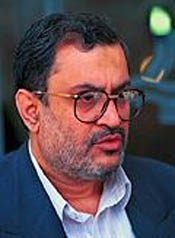Jointly published by the United States Committee for a Free Lebanon and the Middle East Forum
Back to March 2000 Table of Contents
Back to Middle East Intelligence Bulletin homepage.
Iran's "Shadow Government" Uses Violence to Intimidate Moderates
MEIB Staff
The attempted assassination of a leading Iranian reformer earlier this month underscores the possibility that Iran's hard-line clergy and its supporters may not be willing to peacefully abdicate their remaining power in the aftermath of reformist victories in last month's parliamentary elections
 |
| Said Hajjarian |
Said Hajjarian, editor of the country's leading reformist newspaper, Sobh-e Emrouz ("This Morning"), and a close adviser of President Mohammad Khatami, was gunned down at point blank range outside Teheran's municipal offices on March 12. Hajjarian, 47, was considered by many to be the mastermind of the reformists' campaign strategy in last month's parliamentary elections. His activities as an executive member of the Islamic Iran Participation Front (IIPF), the main reform party headed by Khatami's brother Mohammad Reza, the role of his newspaper in airing anti-government dissent, and his political skill in brokering compromises among leaders of Iran's disparate reform movement made him many enemies within the conservative establishment. Hajjarian is in serious condition at a Teheran hospital.
The alleged assailant, Said Asghar, was arrested along with five accomplices several days after the attack. Asghar, a chemistry student at the conservative Free Islamic University of Teheran, reportedly belongs to a militant organization that has been linked to attacks against students during the demonstrations that swept Iran last year. Several Iranian press reports noted that the high-powered motorbike used by Asghar to flee the scene is of a kind reserved here exclusively for government agencies. Armed guards at the municipal offices did not chase after the assailants.
Prior to the shooting, Hajjarian had been investigating the involvement of Iran's Intelligence Ministry in the 1998 killings of five dissident writers and intellectuals. Hajjarian had helped establish the ministry after the 1979 Islamic revolution and used his contacts there to provide information to Iranian journalist Akbar Ganji, who wrote a series of exposes about the assassinations. "Hajjarian played a big role in exposing those behind the serial killings, and for that he had received many, many death threats in recent months," said Ganji earlier this month.1 Iranian police later arrested "rogue" Iranian intelligence agents responsible for the murders and found in their possession a list with the names of 200 cultural, artistic and media figures scheduled to be assassinated.2
President Khatami said after the attack that "the enemies of freedom wrongly believe that they can attain their goals by assassinating a pious intellectual who was serving the nation." Pro-reform newspapers went even further, blaming the assassination attempt on hardline conservatives opposed to President Khatami's social and political reforms. Hajjarian's newspaper published reports stating that Asghar and his accomplices have links to an unidentified "organization" in the Iranian government and denouncing the existence of a "shadow government of assassins active in the halls of power in the Islamic republic" and called upon the Iranian public to "destroy the shadow government."3
Former Iranian President Abolhassan Bani Sadr said in a March 24 interview that the Revolutionary Guards (Pasdaran) controlled by Ayatollah Ali Khamenei were responsible for the shooting. Bani Sadr pointed out that, in addition to the six suspects arrested by investigators assigned to the case by President Khatami, the Pasdaran has arrested several people in recent days, fearing that they might implicate senior members of Iran's clerical establishment. "This terror is part of a new policy after the recent legislative elections to enable (conservatives) to regain control of the state and block the development of the regime," said Bani Sadr, who has been in exile in France since 1981. "The goal is to block the reformists from getting further."4
The magnitude of the reformist triumph in Iran's parliamentary elections in February was striking, given the fact that many of the country's best-known reformers were not even permitted to run (the Council of Guardians, which screens candidates for public office, is controlled by Iran's clergy). Reformist candidates allied with President Mohammad Khatami won 170 seats, whereas hardline conservatives took 45 and independents won 10. While the remaining 65 seats in Iran's 290-seat parliament's are to be decided in run-off elections in April, the reformists are assured of a majority. Around 83% of Iran's 38.7 million eligible voters cast ballots in the election. The humiliating loss by dozens of well-known conservative politicians led many analysts to predict a violent backlash.
1 "Iranian reformer fighting for his life had received many death threats," Associated Press, 13 March 2000.
2 The Iran News (Teheran), 12 March 2000.
3 Sobh-e Emrouz (Teheran), 21, 22 March 2000.
4 "Former president points finger at conservatives over shooting," Agence France Presse, 24 March 2000.
� 2000 Middle East Intelligence Bulletin. All rights reserved.
MEIB Main Page

